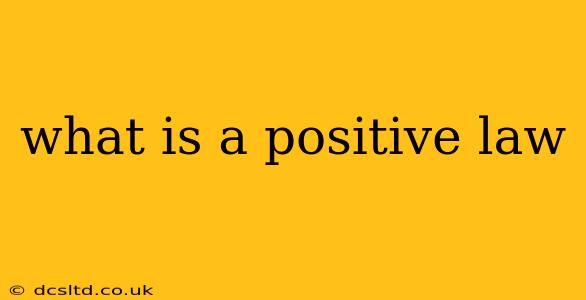Positive law, also known as statutory law, is a system of rules created and enforced through social or governmental institutions. Unlike natural law, which focuses on inherent rights and morality, positive law is concerned with the written rules and regulations enacted by a legitimate authority. This means that its validity doesn't depend on its inherent morality or justice, but solely on its source and proper enactment. Understanding positive law is crucial to grasping the foundation of most modern legal systems.
What are the Key Characteristics of Positive Law?
Positive law distinguishes itself through several key characteristics:
- Created by a Sovereign Authority: Laws are created by a recognized body—a legislature, a parliament, a monarch, or another governing entity—with the power to enforce them. This authority is essential for the legitimacy of the law.
- Enforceable through Sanctions: Positive laws are backed by the power of the state. Failure to comply results in consequences, which can range from fines and imprisonment to other forms of legal penalty.
- Written or Codified: While some customary laws might evolve into positive law, the core of positive law is typically documented and accessible. This written nature allows for clarity, consistency, and a more transparent legal system.
- Secular in Nature (Generally): While religious principles might influence the content of laws, positive law itself is generally independent of religious doctrine and operates within a secular framework.
- Specific and Definable: Positive laws strive for clarity and precision to minimize ambiguity and ensure fair and consistent application.
What is the Difference Between Positive Law and Natural Law?
This is a crucial distinction. Natural law posits that certain moral principles are inherent and universally applicable, independent of human-made laws. Think of concepts like the right to life or the prohibition against murder. These are often seen as existing naturally, regardless of whether they're codified in positive law.
Positive law, in contrast, is entirely dependent on its human creation and enforcement. A law might be considered unjust or immoral under natural law principles, but it remains legally valid positive law as long as it was enacted by the proper authority.
How is Positive Law Created?
The process varies depending on the legal system. Generally, it involves:
- Legislative Process: This is the most common route. Proposed laws are drafted, debated, amended, and then voted upon by a legislative body. If approved, they become law.
- Judicial Precedent (Common Law): In common law systems, court decisions establish precedents that shape future legal interpretations and applications. These precedents essentially create law through judicial rulings.
- Executive Orders: In some systems, the executive branch (e.g., a president or governor) can issue executive orders that have the force of law, though these are typically limited in scope and subject to judicial review.
What are some examples of Positive Laws?
Almost all laws you encounter daily are examples of positive law: traffic regulations, tax laws, criminal statutes, contract law, property law, and so on. These are all human-made rules enforced by the state, and their validity rests solely on their legitimate origin and enactment.
Is Positive Law Always Just or Moral?
This is a question debated for centuries. Positive law doesn't inherently guarantee justice or morality. A law can be legally valid but morally reprehensible. The existence of unjust laws throughout history underscores this fact. However, the goal of most modern legal systems is to strive for laws that align with principles of justice and fairness, even within the framework of positive law. This is often achieved through mechanisms like judicial review, public debate, and ongoing legal reforms.
Frequently Asked Questions (FAQ)
What are the criticisms of positive law?
Some argue that positive law can lead to oppression if not properly constrained by checks and balances. The potential for arbitrary or unjust laws to be enforced solely because of their legal validity is a major concern. The separation of powers and independent judiciaries are crucial mechanisms designed to mitigate these risks.
What is the relationship between positive law and morality?
While distinct, the relationship between positive law and morality is complex and often intertwined. A just legal system ideally reflects societal values and moral principles, yet it must also operate within a structured and enforceable framework distinct from purely moral considerations.
How does positive law differ from international law?
While international law shares some similarities with positive law (it's a system of rules), it lacks a truly sovereign enforcer in the same way national legal systems do. International law relies on treaties, agreements, and international organizations for its legitimacy and enforcement, which presents unique challenges.
In conclusion, positive law forms the backbone of most modern legal systems, providing a framework for order and governance. Understanding its characteristics and limitations is crucial for anyone seeking to navigate and understand the legal landscape.
